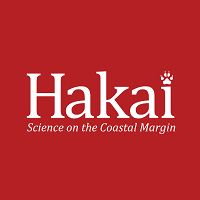Hakai Coastal Initiative Postdoctoral Fellow Position
EXPIRED OPPORTUNITY
04 Sep 2018
News Source: The University of British Columbia
The Hakai Institute is hiring for a two-year postdoctoral fellowship on 'Linking the land and sea on the British Columbia coast.'
Linking the land and sea on the British Columbia coast: How dynamic nutrient fluxes from small rainforest watersheds shape cross-system connections.
Applications are invited for a two-year postdoctoral fellowship with the Hakai Coastal Initiative at the University of British Columbia. Application deadline is September 15th.
Coastal temperate rainforests of the world are linked to coastal oceans through the riverine flux of freshwater and terrestrial materials. The coastal temperate rainforest of North America is a global hotspot for carbon storage on land and carbon transport from land to sea, suggesting a potential hotspot for marine processing of terrestrial materials. This transport is variable at scales ranging from individual storm events, to seasons, to inter-annual climate anomalies, suggesting a land-ocean connection that may turn ‘on and off’ depending on climatic conditions. Since 2013, the Hakai Institute has been collecting year-round measurements of stream chemistry and discharge to the ocean in a Critical Zone Observatory consisting of seven small watersheds in the BC coastal rainforest. The dataset spans over 5 years and 3 climate anomalies (including the extreme El Nino year of 2015-2016).
We seek a post-doctoral fellow to analyze the stoichiometric relationships of freshwater nutrient exports as well as the dynamic coupling of nutrient export with weather and climate. The project aims to characterize the magnitude and dynamics of key fluxes in comparison to other regions of the world, through the lens of the receiving marine ecosystems. A complete biogeochemistry and hydrology dataset is available as well as rich ancillary data from the Observatory (e.g., weather stations, detailed soil mapping). The project is supported by Hakai Institute staff with expertise in data collection, data management, and data publishing. Collaborating scientists have expertise in biogeochemistry, hydrology, oceanography, microbial ecology, and landscape ecology.
Necessary qualifications:
- A PhD in biogeochemistry, ecohydrology, or aquatic ecosystem ecology
- Knowledge of catchment science concepts and methods
- Proficient with the use of R or other relevant statistical packages for analysis of time series and other data
- Proven publication record
- Excellent collaboration and team communication skills
- Commitment to data archiving and sharing in the Observatory context
Beneficial qualifications:
- Prior knowledge of coastal ocean biogeochemistry and food web processes
- Process modelling experience, including the simulation of constituent flux
- Use of optical techniques for characterization of dissolved organic matter
Location:
The candidate will be based at the Institute for the Oceans and Fisheries (http://oceans.ubc.ca/), University of British Columbia, Vancouver, Canada. The candidate will be under the supervision of Dr. Brian Hunt and will work closely with Dr. Suzanne Tank of the University of Alberta, Dr. Ken Lertzman of Simon Fraser University, and Ian Giesbrecht of the Hakai Institute.
Periodic field trips to Hakai Institute field stations will be required (www.hakai.org).
Application closure date: September 15, 2018
Start date: As soon as possible
Position Length: Two years
Salary: CA$65,000 / year including benefits.
Applications:
Applicants should submit:
- A CV, including the e-mail and phone number for three references;
- A short cover letter explaining the applicant’s motivation for working on the project and how previous experience qualifies them for this position;
- Reprints of 3 published papers, if available
Submit applications to:
Dr. Brian Hunt (b.hunt@oceans.ubc.ca); Ian Giesbrecht (ian.giesbrecht@hakai.org); and Dr. Ken Lertzman (lertzman@sfu.ca).
Equity and diversity are essential for academic excellence. An open and diverse community fosters the inclusion of voices that have been underrepresented or discouraged. We encourage applications from members of groups that have been marginalized on any grounds enumerated under the B.C. Human Rights Code, including sex, sexual orientation, gender identity or expression, racialization, disability, political belief, religion, marital or family status, age, and/or status as a First Nations, Metis, Inuit, or Indigenous person.
News Source:
READ MORE from The University of British Columbia >>
News Category:
OPPORTUNITIES
Explore Further

